Memories from Cash Siblings
Joanne Cash and Tommy Cash share their memories of growing up in Dyess and their thoughts on the upcoming concert to be held in the field next to their childhood home. Details
Joanne Cash and Tommy Cash share their memories of growing up in Dyess and their thoughts on the upcoming concert to be held in the field next to their childhood home. Details
Benefits of the Historic Dyess Colony: Johnny Cash Boyhood Home are discussed in this video from the Arkansas Parks, Recreation and Travel Commission meeting in Dyess. View
Rosanne Cash, Kris Kristofferson to Headline Johnny Cash Heritage Festival Inaugural Concert. Details
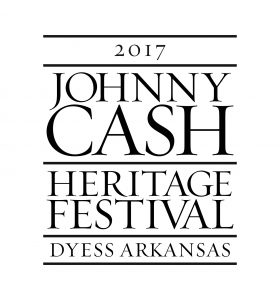 A call for presentations for a public symposium in conjunction with the inaugural Johnny Cash Heritage Festival has been issued by Arkansas State University. The symposium, “Johnny Cash Heritage Festival: Arts and Artistry from the New Deal and Beyond,” will be held in Dyess, Ark., Thursday through Saturday, Oct. 19-21.
A call for presentations for a public symposium in conjunction with the inaugural Johnny Cash Heritage Festival has been issued by Arkansas State University. The symposium, “Johnny Cash Heritage Festival: Arts and Artistry from the New Deal and Beyond,” will be held in Dyess, Ark., Thursday through Saturday, Oct. 19-21.
The event is co-sponsored by the Historic Dyess Colony: Johnny Cash Boyhood Home and the A-State Heritage Studies Ph.D. Program.
“I’m excited to coordinate the symposium,” said Dr. Gregory Hansen, professor of folklore and English at A-State. “Not only will it support public programming at our Dyess heritage site, but it will create invaluable opportunities for students and faculty affiliated with A-State’s Heritage Studies Doctoral Program.”
Symposium organizers seek proposals that address how the New Deal era resettlement colony influenced the life and music of Johnny Cash. Many of his songs are stories of actual experiences in Dyess, while others reflect values shaped in Dyess. Though the focus is on his early life, all Johnny Cash-related topics will be considered.
Additionally, presentations that provide insight into the New Deal heritage that shaped the life of Johnny Cash and those around him are welcome. Cash’s childhood spent in one of the New Deal’s greatest social and economic experiments placed him squarely in the center of New Deal cultural programs focused on common men and women.
Organizers particularly are interested in presentations that break away from the standard format of reading research papers. Research and artistic presentations that incorporate music, images, film, computer graphics, and other interactive elements will be given first preference. The scholarly content also should be presented in ways that appeal to more generalized audiences and non-specialists in particular disciplines.
A new chapter was announced in May with the Johnny Cash Heritage Festival. The new event that combines educational activities in Dyess, as well as entertainment and special events, continues the legacy of the earlier concert series held in Jonesboro.
Dr. Ruth Hawkins, director of the Arkansas State University Heritage Sites program, noted the event would become a true festival by extending to a three-day event that includes both educational and entertainment components.
“The symposium’s location in Cash’s hometown of Dyess is a rare opportunity for participants to embrace the environment in which Cash grew up,” Hawkins said.
Presentation entries must include presenter’s name and affiliation and a 150-word abstract of the presentation as well as a current vita (two pages maximum). Include address, phone number, email address and the technical needs for the presentation.
Click here to download a copy of the Call for Presentations. For further information, contact Hansen at ghansen@AState.edu or visit johnnycashheritagefestival.com. Deadline for entries is June 16, 2017.
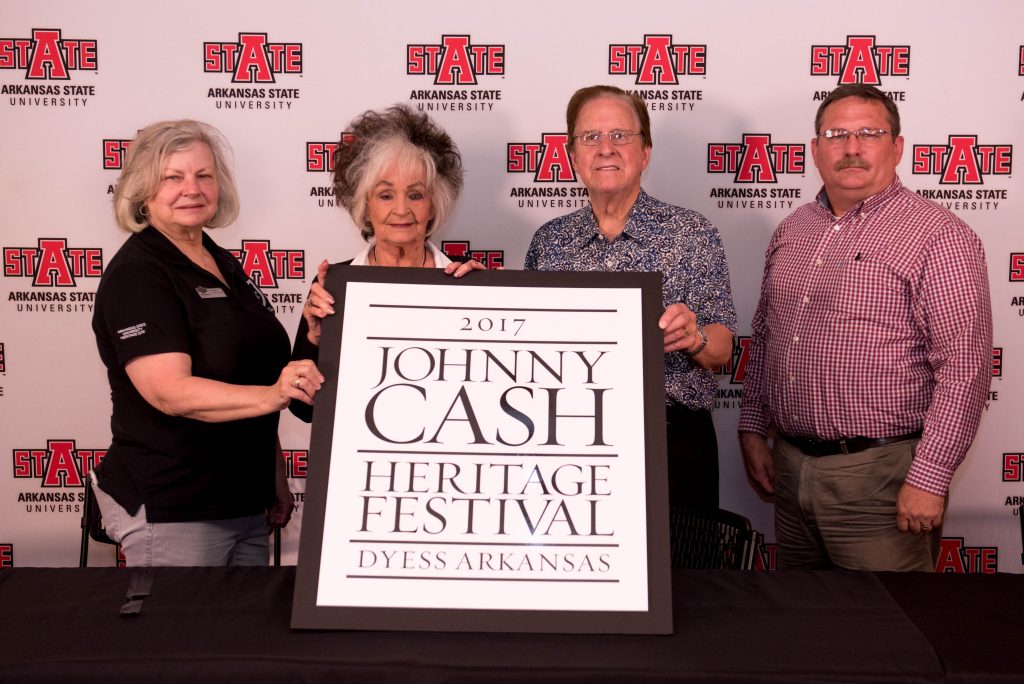
(From left) Dr. Ruth Hawkins, director of Arkansas State University Heritage Sites program; Joanne Cash Yates, Johnny Cash’s sister; Tommy Cash, Johnny Cash’s brother and Dyess mayor Ken Gilmore.
JONESBORO — After the immensely successful music events honoring international music icon Johnny Cash and benefitting restoration of his boyhood home, a new chapter begins in 2017 with the Johnny Cash Heritage Festival.
The new event that combines educational activities in Dyess, as well as entertainment and special events, continues the legacy of the earlier concert series held in Jonesboro.
“I am thrilled to join Arkansas State University in announcing the first Johnny Cash Heritage Festival,” said Rosanne Cash, who worked with the university in developing plans for the festival. “For the first time, we will hold a festival in Dyess, in the cotton fields surrounding my dad’s childhood home and in the town center of the colony. We foresee an annual festival that will include both world-renowned artists on the main stage and local musicians on smaller stages, as well as educational panels, exhibits and local crafts.”
The inaugural Johnny Cash Heritage Festival is set for Oct. 19-21, 2017, in Dyess. It will be extended beyond music to become a “heritage” festival, thus creating a great sense of both time and place associated with Johnny Cash’s early years.
“As anyone who has spent any time listening – truly listening – to Johnny Cash knows, his music was born of some of the most profound events of the 20th century,” said A-State Chancellor Tim Hudson. “A child of the Great Depression and an advocate for those without a voice in the 1960s, his legacy is point of entry for generations to come to understand America. By incorporating discussions of the societal and historical forces that shaped our nation into this celebration, we are broadening the understanding of Johnny Cash.”
Johnny Cash’s two living siblings, Joanne Cash Yates and Tommy Cash, were present for the announcement.
Dr. Ruth Hawkins, director of the Arkansas State University Heritage Sites program, noted the event would become a true festival by extending from a one-evening concert event to a three-day event that includes both educational and entertainment components. She also stated that the Heritage Studies, Ph.D. program would coordinate the educational/academic events with overall coordination through Arkansas State University Heritage Sites.
“Assisting in carrying out the Master Plan for making the Dyess Colony and Johnny Cash Boyhood Home a major tourism destination will continue as one of the key goals of the festival,” Hawkins said. “The next phase will be to re-create the farmstead buildings at the Cash Boyhood Home and to provide other needed services and amenities for heritage tourists who come to visit the site.
“It is fitting to incorporate the New Deal heritage that was part of Johnny Cash’s formative years into a major annual event that shines light on a critical era that is fading from memory,” Hawkins continued. This three-day event will include entertainment events on Friday and Saturday, preceded by an educational conference on Thursday and Friday, she added.
For further announcements regarding the October 2017 festival, visit the festival Website or Facebook page.
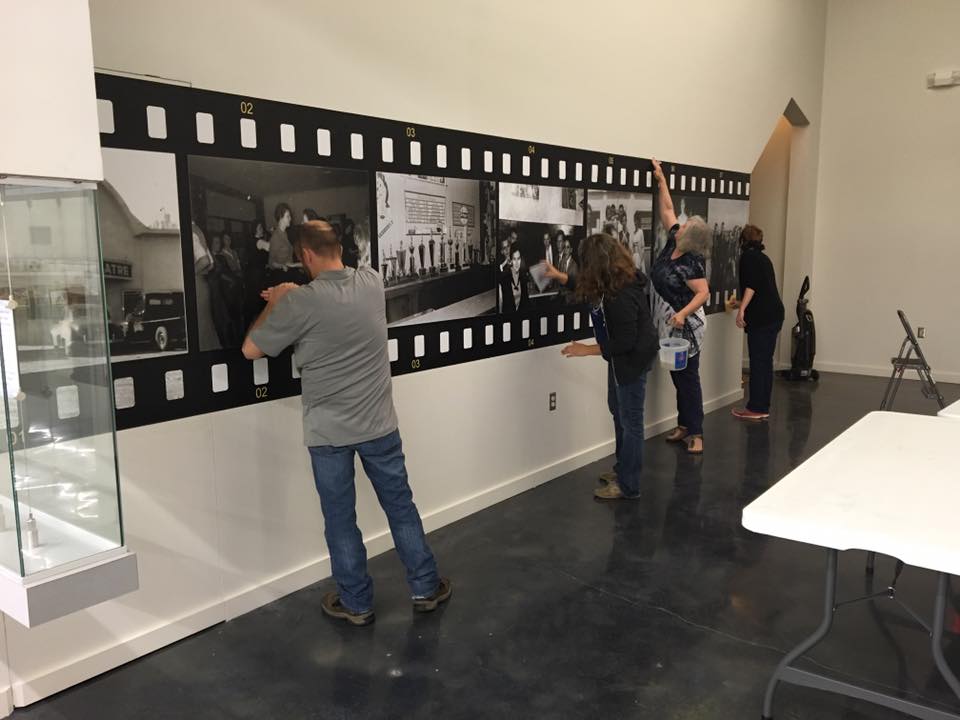 JONESBORO — Visitors will have an opportunity to celebrate the Grand Opening of the Dyess Colony Visitors Center at the site of the former theatre and pop shop, Saturday, May 21, in Colony Circle, 110 Center Drive. Transformation of the theatre and pop shop into the Visitors Center is phase two of the master plan for the Dyess Colony restoration.
JONESBORO — Visitors will have an opportunity to celebrate the Grand Opening of the Dyess Colony Visitors Center at the site of the former theatre and pop shop, Saturday, May 21, in Colony Circle, 110 Center Drive. Transformation of the theatre and pop shop into the Visitors Center is phase two of the master plan for the Dyess Colony restoration.
Remarks are at 10:30 a.m. Hamburgers, hot dogs and soft drinks are available at the Colony Circle site from 11 a.m.-1 p.m. From 9 a.m.-3 p.m., tours of the administration building exhibits, the Johnny Cash Boyhood Home and Visitors Center are available free of charge. Joanne Cash and Tommy Cash, siblings of legendary singer Johnny Cash, will be on hand for remarks. Tommy was once a projectionist at the theatre.
The special event coincides with the 80th anniversary of the grand opening of the original Colony Circle buildings. In August 2014, phase one, including restoration of the administration building and the Cash home, was opened to the public.
In order to preserve the heritage of the Dyess Colony, A-State personnel, led by Dr. Ruth Hawkins, executive director of Arkansas State University’s Arkansas Heritage Sites program, and assistant director Paula Miles, have worked diligently to obtain grants and private donations to restore key structures in the Dyess area. When restoration of theatre began, only the front façade was standing.
The original community building burned and a new theatre was built in 1947. Now completely reconstructed, it serves as a visitor/orientation center, featuring films, materials and other exhibits.
The colony was named Dyess Colony, as a federal agricultural resettlement community for Mississippi County native and for Arkansas’s first Works Progress Administration (WPA) manager, William Reynolds Dyess.
The Dyess Colony was created in 1934 as part of President Franklin D. Roosevelt’s New Deal to aid in the nation’s economic recovery from the Great Depression. As a federal agricultural resettlement community, it provided a fresh start for nearly 500 impoverished Arkansas farm families, including the family of Johnny Cash.
The colony was laid out with a town center at the hub and farmsteads stretching out from the center. The first 13 families arrived in October 1934. On May 22, 1936, an official dedication was held on the second anniversary of the colony. The project was renamed Dyess Colony in honor of its founder, W.R. Dyess, who died in a plane crash earlier that year.
Several weeks after the official dedication, First Lady Eleanor Roosevelt visited Dyess and addressed the colonists from the front steps of the colony’s administration building.
For additional information, call (870) 764-CASH (2274).
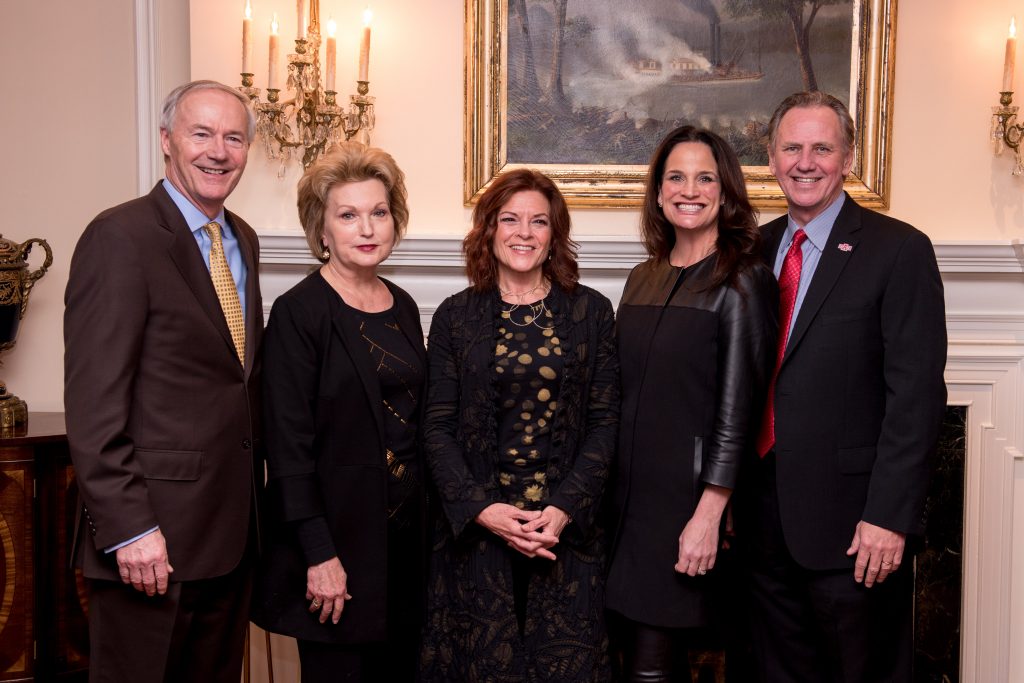
Arkansas Governor Asa Hutchinson, First Lady Susan Hutchinson, Rosanne Cash, Dr. Dee Dee Hudson, Dr. Tim Hudson
“As we promote Arkansas tourism, we recognize that a significant part of the future of tourism in this state is our heritage sites, including the Johnny Cash Boyhood Home in Dyess,” Gov. Hutchinson stated. “The support of the Cash family and the connection to Rosanne Cash to this state is significant, and I am delighted that the state can continue to support Arkansas State University in preserving these heritage sites for the next generation.”
Gov. Hutchinson, First Lady Susan Hutchinson and Arkansas State University hosted the benefit event. There was a reception and photo opportunity, followed by “Memories, Music, and More,” including Cash’s reflections on her involvement with restoration of her father’s home and music inspired by her reconnections with the South. She began working with A-State in 2011 to acquire and restore the home and has remained actively involved in the project.
Rosanne, a four-time Grammy winner, performed a concert for a sold-out crowd of 200 invited guests. In addition to the discretionary fund donation, the event also netted just over $20,000.
“We appreciate the governor’s understanding of the value of Arkansas heritage and history. We have benefited from the work and support of many people along the way including other members of the Cash family,” A-State Chancellor Tim Hudson stated at the event.
“We are also very grateful for Rosanne Cash, not only for her willingness to share her remarkable talent, but also for her work on the Johnny Cash Boyhood Home project. People with celebrity and name recognition lend their names to things; but, not only has she done that, she has been hands-on from the very start of the project, promoting it around the world, helping to connect the artists to help us raise funds we need to make the project successful, donating items and getting others to donate items.”
The funds will go toward additional Cash outbuildings, including moving and refurbishing existing colony structures and acquiring materials from original Dyess colony buildings for use in reconstruction. A barn will be built and adapted on the interior for use as classroom, office, conference and special event space. The estimated cost of these projects is around $500,000, and will come from privately raised funds or grants. Work will begin quickly on the smaller structures, but the timeline for the barn will depend upon additional private funding.
When her album, The River and the Thread was released in 2014, Rosanne Cash discussed the boyhood home restoration project’s influence on her music during appearances on nationally televised programs such as CBS Sunday Morning and the Katie Couric Show, and in interviews in The Guardian, the New York Times, Smithsonian Magazine and numerous other media. She also has mentioned Arkansas State University during concert tours throughout the world.
“I hope everyone will go visit the Johnny Cash Boyhood Home in Dyess. It’s an amazing place. People from all over the world come to that place to see this icon of American culture and how he lived and how he developed his talent to make him so loved and famous around the world,” said Chancellor Hudson.
The Dyess Colony was created in 1934 as part of President Franklin D. Roosevelt’s New Deal to aid in the nation’s economic recovery from the Great Depression. As a federal agricultural resettlement community, it provided a fresh start for nearly 500 impoverished Arkansas farm families, including the family of music legend Johnny Cash.
The Johnny Cash Boyhood Home opened in August 2014, along with exhibits in the Historic Dyess Colony Administration Building. The Arkansas State University Heritage Site is open to the public from 9 a.m. to 3 p.m. Monday through Saturday.
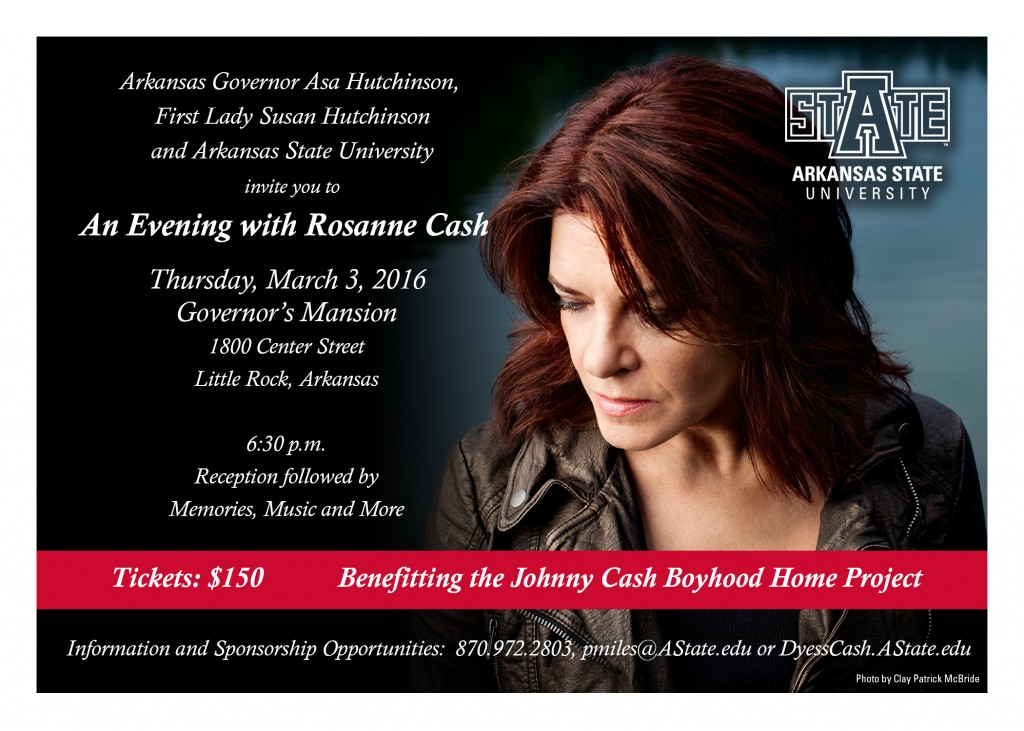
Grammy-award winning singer and songwriter Rosanne Cash will be in Little Rock Thursday, March 3, for “An Evening with Rosanne Cash” at the Arkansas Governor’s Mansion.
The benefit event will be hosted by Governor Asa Hutchinson, First Lady Susan Hutchinson, and Arkansas State University, with proceeds going to the Johnny Cash Boyhood Home in Dyess.
The event will begin at 6:30 p.m. with a reception and photo opportunity, followed by “Memories, Music, and More,” including Cash’s reflections on her involvement with restoration of her father’s home and music inspired by her reconnections with the South. She began working with A-State in 2011 to acquire and restore the home and has remained actively involved in the project.
Tickets are $150 per person. Sponsorship opportunities also are available. Gold sponsorships are $2,500 and include eight event tickets, recognition at the event, and first section seating. Silver sponsorship at $1,000 and include four event tickets, recognition at the event, and second section seating.
Tickets or sponsorships may be obtained by calling 870-972-2803, e-mailing pmiles@astate.edu, or going to AState.edu/donations to pay securely online by credit card. (Please put “Cash Benefit” in the “Other” category). Checks may be made to Johnny Cash Boyhood Home and mailed to P. O. Box 2050, State University, AR 72467. Limited tickets are available and must be purchased no later than Feb. 22.
The Johnny Cash Boyhood Home opened in August 2014, along with exhibits in the Historic Dyess Colony Administration Building. The Arkansas State University Heritage Site is open to the public from 9 a.m. to 3 p.m. Monday through Saturday.
The next phase of the project will include re-creating the Cash farmstead buildings, including the barn (to be adapted inside for classroom and special events space), smokehouse, chicken coop, and outhouse.
When her album, “The River and the Thread” was released in 2014, Rosanne Cash discussed the boyhood home restoration project’s influence on her music during appearances on nationally televised programs such as CBS Sunday Morning and the Katie Couric Show, and in interviews in The Guardian, the New York Times, Smithsonian Magazine and numerous other media. She also has mentioned Arkansas State University during concert tours throughout the world.
A great story on the Johnny Cash Boyhood Home by Ken Beck in the Wilson Post (Tennessee) paper. Click here to read the full article.
A-State Heritage Sites
Arkansas State University
P. O. Box 2050
State University, AR 72467
870-972-2803
